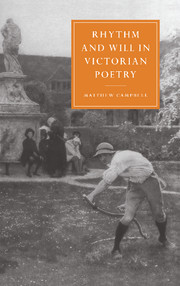Book contents
- Frontmatter
- Contents
- Preface and acknowledgements
- Texts used
- Chapter 1 Introduction: two decisions
- Part One RHYTHMS OF WILL
- Part Two MONOLOGUE AND MONODRAMA
- Chapter 4 Browning and the element of action
- Chapter 5 ‘'Tis well that I should bluster’: Tennyson's monologues
- Part Three MAKING A WILL
- Notes
- Bibliography
- Index
- CAMBRIDGE STUDIES IN NINETEENTH-CENTURY LITERATURE AND CULTURE
Chapter 4 - Browning and the element of action
Published online by Cambridge University Press: 22 September 2009
- Frontmatter
- Contents
- Preface and acknowledgements
- Texts used
- Chapter 1 Introduction: two decisions
- Part One RHYTHMS OF WILL
- Part Two MONOLOGUE AND MONODRAMA
- Chapter 4 Browning and the element of action
- Chapter 5 ‘'Tis well that I should bluster’: Tennyson's monologues
- Part Three MAKING A WILL
- Notes
- Bibliography
- Index
- CAMBRIDGE STUDIES IN NINETEENTH-CENTURY LITERATURE AND CULTURE
Summary
In his essay ‘The Novel in The Ring and the Book’, Henry James imagines just what the poem might have been if written as a novel. Much of the essay is concerned with suggesting that the ‘sense, almost the pang of the novel [it] might have constituted, sprang sharply’ from it, and that the poem is ‘a work of art … smothered in the producing’. It is as if artistic production, as labour and childbirth, has been followed by infanticide. To state why he thinks that Browning failed not onl to deliver a novel, but also why he conveys ‘clustered hugeness or inordinate muchness’, James puts forward an encounter with the poet which is not an encounter with the novelist:
we feel ourselves, however much or however little to our advantage we may on occasion pronounce it, in the world of Expression at any cost. That essentially is the world of poetry – which, in the cases known to our experience where it seems to us to differ from Browning's world, does so but through this latter's having been by the vigour and the violence, the bold familiarity, of his grasp and pull at it, moved several degrees nearer us, so to speak, than any other of the same general sort with which we are acquainted; so that, intellectually, we back away from it a little, back down before it, again and again, as we try to get off from a picture or a group or a view which is too much upon us and thereby out of focus. Browning is ‘upon’ us, straighter upon us always, somehow, than anyone else of his race; and we thus recoil, we push our chair back, from the table he so tremendously spreads, just to see a little better what is on it. That makes a relation with him that is difficult to express; as if he came up against us, each time, on the same side of the street and not on the other side, across the way, where we mostly see the poets elegantly walk, and where we greet them without danger of concussion. It is on this same side, as I call it, on our side, on the other hand, that I rather see our encounter with the novelists taking place; we being, as it were, more mixed with them, or they at least, by their desire and necessity, more mixed with us, and our brush of them, in their minor frenzy, a comparatively muffled encounter.
- Type
- Chapter
- Information
- Rhythm and Will in Victorian Poetry , pp. 99 - 124Publisher: Cambridge University PressPrint publication year: 1999

